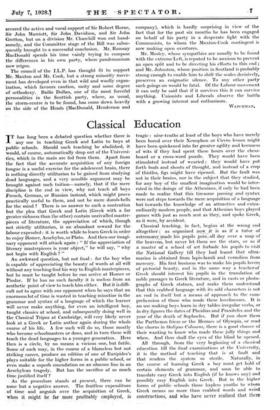The Week in Parliament
IT is clear that • a revolution is necessary in these days, if the people of Great Britain are to be galvanized into some sort of political activity. Mere threats are not of the slightest use. It might have been supposed that the publication of proposals for the abolition of most of our local government bodies, and the transformation of the remainder, would have excited a fairly widespread degree of interest. The designs of the Ministry of Health, and still more those of the Scottish Office, are revolutionary in essence, and con- stitute a reform more widespread, more sweeping, and more daring, than has been attempted at one swoop by any previous administration.
They have produced up to date a few grumbles from town councillors whose powers it is proposed to' halve, and guardians or parish councillors who are faced with extinction. Otherwise the country has continued to indulge in that profound slumber from -which it was momentarily, and to its intense indignation, aroused in 113n, and has since enjoyed undisturbed ' by any political proceedings within or without the House of Commons.
The dullness of the by-elections is indescribable— apathetic audiences, small polls, foregone results. Is it that no one cares ? Or can it be that the electorate has decided to await the General Election before taking any real interest or trouble ? Time alone will show. And in the meantime the foundations of an entirely new system of local government continue to be laid. Mr. Neville Chamberlain is engaged in adroitly guillo- tining the Rating Valuation (Apportionment) Bill to the Statute Book. Mr. Lloyd George distracts our attention with humorous interludes in the country, and in the House whiles away the time before the knif4 fails, with pleasant talk about the woodlands. Sir Henry Buckingham conducts interminable arguments with the Chancellor of the Exchequer upon the subject of surtax, but as neither pays the faintest attention t4 anything the other says, the even course of the Financ Bill remains tindeflected. On Thesday night Sir Henry secured the active and vocal support of Sir Robert Home, Sir John Marriott, Sir John ,Davidson, and -Sir John Gretton, but on a division-Mr. Churchill won out hand- • somely, and the Committee stage of the, Bill -was subse- Auently brought to a successful conclusion. Mr. Ramsay MacDonald spends his time vainly trying to compose the differences in his own party, where pandemonium now reigns.
The council of the I.L.P. has thought fit to support Mr. Maxton and Mr. Cook, but a strong minority move- ment has developed even in that wild and woolly organ- ization, which favours caution, unity and some degree of orthodoxy. Bailie Dollan, one of the most forceful personalities in the Scottish party, where, as usual, the storm-centre is to be found, has come down heavily on the side of the Heads (MacDonald, Henderson and company), which is hardly surprising in view of the fact that for the past six months he has been engaged on behalf of his party in a desperate fight with the Communists, to whom the Maxton-Cook contingent is now making open overtures.
Mr. Mosley, whose sympathies are usually to be found with the extreme Left, is reputed to be anxious to prevent an open split and to be directing his efforts to this end ; and Mr. Johnston, whose position in Scotland is probably ,strong enough to enable him to shift the scales decisively, preserves an enigmatic silence. To any other party such goings on would be fatal. Of the Labour movement it can only be said that if it survives this it can survive anything. Unionists and Liberals observe the battle with a growing interest and enthusiasm. .
WATCHMAN,













































 Previous page
Previous page